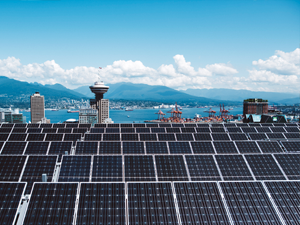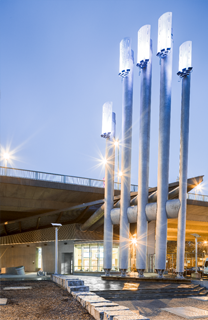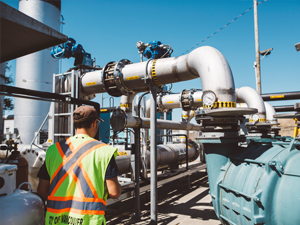Vancouver lays out a strategy and a plan of action for its transition to 100% renewable energy

In 2015, The City of Vancouver became the first city in North America to set a comprehensive renewable energy target which commits the City to get 100% of the energy used in Vancouver from renewable sources before 2050 and reduce carbon pollution by at least 80% below 2007 levels before 2050.
To guide this transition, the City has adopted a strategy and action plan to identify the actions that will make it possible:Renewable City Strategy and Renewable City Action Plan.
For those communities that cannot find the additional funds in their budget, you could narrow the scope of any modelling or forgo it entirely and still produce a solid set of actions.
PROJECT SUMMARY
Building on its history of taking action on climate change and its vision to become the Greenest City in the world, the City of Vancouver set a bold new target to source all of its energy from 100% renewable energy sources by 2050. This commitment and the strategic approaches are outlined in the City’s Renewable Energy Strategy. The Strategy was adopted in November 2015 and builds upon the Greenest City by 2020 Action Plan,which sets a goal for the City to eliminate dependence on fossil fuels and commits the City to reduce Greenhouse Gas (GHG) emissions by at least 80% below 2007 levels before 2050. The Renewable Energy Strategy also complements a number of other documents that guide the City’s vison, such as: Transportation 2040, Vancouver Economic Action Strategy, and Healthy City Strategy.
In 2015, the City’s emissions were 2.8 million tonnes of CO2, one of the lowest GHG emissions per person in North America. In addition, at the time when the Renewable Energy Strategy was adopted, the City derived 31% of its energy use from renewable sources for its building and transportation needs and 90% of its electricity comes from hydro power, setting Vancouver ahead of the curve to achieving its renewable energy target.
The City of Vancouver’s Renewable Energy Strategy relies on three main strategic approaches to achieve the target of powering the city entirely with renewable energy:
-

Image courtesy of City of Vancouver Reduce energy use through policies that, for example, increase building insulation requirements, improve transit, walking and cycling networks, etc.
- Increase the use of renewable energy by supporting, for example, adoption of electric vehicles, increased use of Neighborhood Energy Utilities, etc.
- Increase the supply of renewable energy through increased supply of other energy sources such as rooftop solar power generation, biofuels for transportation, etc.
In 2017, the City developed an action plan to make this target a reality. The Renewable City Action Plan outlines a 10-year roadmap and identifies 77 actions that would tackle emissions from buildings, transportation and waste. The action steps were informed by the findings from an economic modeling study that estimated building and transportation energy needs in Vancouver, the two sectors that account for the majority of Vancouver’s GHG emissions. The City will focus on energy needs related to areas where they have regulatory authority such as in building codes, land use, licensing, and permitting and bylaw enforcement. In areas outside of its regulatory domain, the City will advocate and build strong partnerships to achieve this target.
In its own operations, the City of Vancouver has committed to using a range of strategies that will ensure the City leads by example, including developing a comprehensive approach to pricing carbon emissions for municipal operations. The City will also be exploring ways to use its purchasing power to support the adoption of renewable energy and to use its business licensing and permitting authority to support the market adoption of renewable energy for activities undertaken within the city.
Energy Savings/GHG reductions
The City will focus its actions on the three target areas—buildings, transportation and waste—that are responsible for most of the City’s emissions. By first focusing on improving energy efficiency, the City will start with reducing overall energy needs. The remaining energy needs will be supplied primarily by using more renewable energy from existing sources before looking to increase the supply of renewable energy through opportunities like solar and wind power, hydroelectricity, geothermal, sustainable biofuels or renewable natural gas from solid waste.
The City is a firm believer that acting now on climate change will help reduce costs long-term by avoiding more severe climate impacts and the need for costly infrastructure and adaptation measures.
In 2015, Vancouver’s energy was over 59.3 million gigajoules (GJ) a year, releasing 2.8 million tonnes of carbon dioxide (CO2) as a result. Through cumulative results of actions taken towards achieving the 100% renewable energy goal, such as improvements in building performance, increased use of active transport, and improvements in vehicle efficiencies, the City anticipates a reduction of 1/3 of total energy use over 2014 levels by 2050, an equivalent of 21 million GJ energy reduction annually. Beyond reducing energy use, the City expects the strategy will result in a 20% increase of use of electricity by 2050 over 2014 levels, helping reduce the reliance on fossil fuels. The remaining energy needs would be supported through an increase in additional renewable energy supply through biofuels, and new neighbourhood renewable energy systems.
The City commits to using the most stringent international reporting standards to measure its success—currently the Global Protocol for Community-Scale Greenhouse Gas Emission Inventories.
Business case

Achieving the goal will help the City save money, lead to cleaner air and a healthier environment, and strengthen Vancouver’s economy. The City is a firm believer that acting now on climate change will help reduce costs long-term by avoiding more severe climate impacts and the need for costly infrastructure and adaptation measures. The City will see long-term cost savings with more efficient use of energy and reduced energy consumption. To support the transition, the City will be exploring multiple funding mechanisms. This includes the use of traditional financing mechanisms that can be applied to non-traditional technologies, feed-in tariffs to support the increase of wind and solar power generation, green bonds that support green infrastructure projects, use of carbon tax revenues and other environmental levies to raise revenues for green funds that can be used for climate action as direct investment, tax relief, low-interest loans, and other supporting mechanisms.
Further, prices of renewable technologies are expected to continue to drop and remain relatively predictable in the near future while the price of fossil fuels is expected to increase. This provides a relative level of security for the City that investment in, and cost management of, renewable energy sources will support its business case for the transition.
Co-Benefits

Strengthening Economy and Supporting Innovation
The City anticipates that the resulting technological and business transformation and innovation will bring about enhanced quality of life, improved equity, and create a stronger economy. Vancouver’s transition to 100% RE will strengthen the green economy and support innovation through new technological research, incubation, acceleration, and demonstration in the field of renewable energy and energy efficiency. It will also attract ‘green capital’ and enable more innovative financing mechanisms for clean and renewable businesses. The resulting innovation can further strengthen Vancouver’s international reputation as an environmental leader.
Enhanced quality of life
Powering Vancouver with energy from renewable sources will create more integrated and vibrant communities, which will in turn enhance quality of life, improve equity and make Vancouver more economically strong.
Improved Affordability
Vancouver residents will benefit from savings on energy related costs as a result of utilizing technologies that have lower operating costs, such as rooftop solar panels and electric vehicles, as well as having greater opportunities for energy autonomy and improved access to active transportation options.
Improved air quality
Sourcing energy from renewable sources will reduce the amount of pollution associated with burning fossil fuels and will bring about benefits of improved air quality and associated health improvements, as well as reduced pollution risk from leaks.
Strengthening Collaboration
The City cannot successfully achieve this transition in isolation. In order to ensure success, the City will work closely with various partners including the business community, academia, non-profit organizations, surrounding municipalities, other levels of government, public agencies and the public at large.
Lessons learned
- The economic analysis (particularly household level costs and benefits) has been very helpful in discussing the Renewable City Action Plan (RCAP) with different audiences and the City would like to build on it going forward (e.g. better understanding of how the RCAP can help reduce energy poverty).
- Two areas the City would like to improve in the RCAP over time are: 1) the integration between active transportation/transit work with our actions on increasing electric mobility, and 2) the integration between zero emissions buildings and housing/land-use discussions.
- Having high-level plans like the RCS and RCAP in place is helpful because they lay out a clear vision for the City and create the space for the more detailed policies/programs/investments that are needed to achieve the objectives of a clean energy future.
challenges
- At this stage, the City has struggled to get a high volume of zero emissions vehicles and low carbon fuels into the Vancouver market. Increasing the supply is largely out of the City’s jurisdiction, which is why it is encouraging that the Province has moved ahead with the zero emissions vehicle mandate and a strengthened low carbon fuel standard. Both of these policies will make it easier for residents and business to choose electric vehicles and renewable fuels.
- There is a lot going on between keeping on track with the City’s own plan, engaging with the community, and working with partners like the provincial government and utilities. It can be difficult to figure out what to prioritize with all of the competing demands. It helps to know there’s a great network of organizations and people working for similar objectives that you can lean on to keep things moving.
tools and resources
- CoV’s Neighbourhood Energy Strategy
- CoV’s Zero-emission New Building Strategy
- CoV’s Green Bond Framework
Provincial Policies
other examples
- City of Victoria 100%RE Target
- District of Saanich – 100% Renewable & Resilient Saanich
- RDCK’s 100% Renewable Kootenays
local government contact
Matt Horne
Climate Policy Manager, City of Vancouver
T: 604-873-7748
E: matt.horne@vancouver.ca